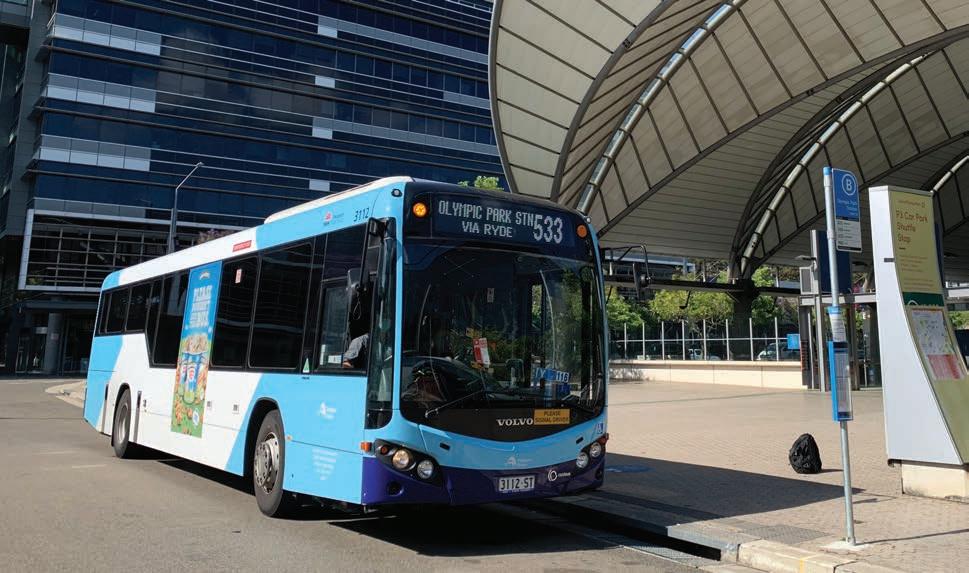
31 minute read
news | the front line
BUSWAYS WINS SYDNEY REGION 7 BUS CONTRACT
PRIVATE AUSTRALIAN bus operator Busways has confirmed industry rumours that it has more than doubled its Sydney operations following being awarded the Region 7 contract.
NSW Minister for Transport and Roads, Andrew Constance, announced the award of one of Greater Sydney’s largest bus contracts to Busways.
From January, 2022, Busways will operate almost 1.1 million trips per year for customers in the Lower North Shore and Inner North West for Greater Sydney Bus Contract 7, extending from Parramatta into the Sydney CBD, Busways says.
It is the first time this network will be managed by a private operator, Busways confirms.
With an appetite for collaborative government and industry partnerships, the company is working across five of TfNSW’s Future Transport Technology Roadmap’s six priority programs for transport technology and customer benefits, it says.
This includes projects in zero-emissions technology, demand-responsive transport, automated passenger vehicle services, and real-time customer information to improve customer experience on the NSW public transport network, it adds.
Busways managing director Byron Rowe says Busways will focus on efficiencies, new technologies and improving the customer experience over the new eightyear contract, including the fleet transformation to zero-emissions electric buses.
“By appointing Busways, the NSW government has backed an Australian-owned company to deliver world-class services for customers of the integrated transport network,” Rowe said.
“We look forward to continuing our highly effective and positive working relationship with the NSW government, our partner for eight decades, to deliver customer value and introduce innovations that help more people to easily, quickly and safely use public transport.”
STAFF, OPERATION EXPANSION
Under the contract, Busways will welcome around 900 employees, 453 buses and two depots to the company’s expanding operations, solidifying its position as Australia’s largest privately owned bus operator,
Above:
From January, 2022, Busways will operate almost 1.1 million trips per year for customers in the Lower North Shore and Inner North West for Greater Sydney Bus Contract 7, it explains. the company says.
The win follows Busways’ expansion into South Australia last year.
“We’re looking forward to welcoming the region’s employees to join our team,” said Rowe.
“This is a priority for us. We will innovate around Covid-19 restrictions.
“It’s important for people to have access to information and opportunities to chat and get to know us” he said.
Rowe says Busways will make significant investment in enhancing services to improve customer journey experiences in the lower North Shore and inner North West, including fleet-wide upgrades for on-board CCTV, two-way radio systems and fleet presentation standards.
Busways will work with Transport for NSW to electrify the fleet,
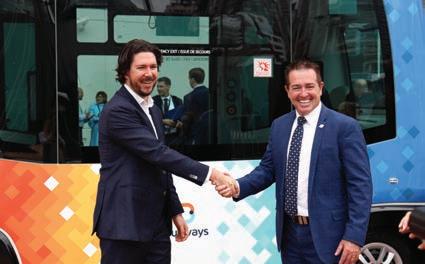
deliver a substantial capital works program to increase depot capacity and introduce smart technology and real-time passenger information at bus stops, with necessary planning already underway, it confirms.
“We are a passionate and energised team backed by a solid and respected track record, Rowe added.
“We’re a unique Australian story. We started running one passenger service in 1942 driven by the belief that people need great public transport.
“Almost eight decades later we’re still passionate and committed to providing a valued bus service that can be relied on,” Rowe stated.
THE PLAN
Busways’ proposal for the Lower North Shore and Inner North West bus network Busways has committed to delivering enhancements for customers and the network, including: • Thirty-five zero emissions buses (ZEBs) • Substantial depot capital works program to increase depot capacity and electrify the fleet; • CCTV upgrades fleet-wide for improved safety and security • New 4G two-way radios fleet-wide for better service reliability and customer information • Cleaning and repair program to lift fleet presentation standards and passenger comfort • Solar-powered smart technology at selected bus stops with real-time service information • Proactive and preventative maintenance regime backed by its ISO 55001 accredited Asset Management System
REGION 7 – IN BRIEF
According to Busways, more than 410,000 people live in Sydney’s CBD, north west, northern harbour and riverside suburbs. The Greater Sydney Bus Contract 7 (GSBC7) bus services enable people to get to jobs, education, health and leisure activities by serving: • key commercial and retail areas • secondary and tertiary education facilities including Macquarie University and Western Sydney University • major health precincts • a range of residential areas from harbour side communities to public housing estates • key tourism and sporting destinations including Sydney Olympic Park, Bankwest Stadium. and Luna Park.
AUSSIE BUS BODY BUILDER PARTNERS WITH BLK AUTO
NSW MID-NORTH COAST’s Express Coach Builders has entered into a commercial agreement with Bonluck bus importer BLK Auto to make zero-emission battery electric and hydrogen fuel-cell buses here in Australia.
The pairing will usher in a range of zero-to-low emission buses and coaches co-engineered by the BLK and Express design teams specifically for the Aussie public transport and mining resources markets.
BLK Auto – the Australian distributor for BLK (aka Bonluck) buses – has established the alliance with Express as the demand for zero-emission buses ramps up locally, with government and private bus operators starting to switch buying criteria to zero emission, the companies explain.
BLK will provide dedicated battery-electric and hydrogen fuelcell-powered chassis, with Express designing and building specialised bodies, engineered to suit the zeroemission BLK chassis.
According to BLK Auto managing director Jason Pecotic, the collaboration with Express will be a win-win for the two companies, as well as for bus operators in Australia.
“We are very pleased to align with Express to deliver clean, green, emission-free buses tailored for Australian operations and using a dedicated battery or fuel-cellpowered BLK chassis, designed from the start as a zero-emission vehicle – not adapted from a diesel design,” Pecotic said.
“Dale Hancox and his team at Express have tremendous capabilities that will deliver the highest-quality standard, locally built, zero-emission buses to meet the increasing demand from the bus market.
“Express has impressed with the standard of its engineering and quality workmanship and we are very pleased to be working with them to deliver the best electric buses for the Australian market,” Pecotic explained.
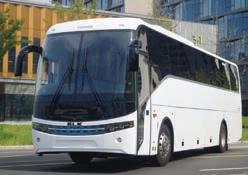
Above:
According to BLK Auto managing director Jason Pecotic, the collaboration with Express will be a win-win for the two companies, as well as for bus operators in Australia.
DIVERSIFICATION OPPORTUNITY
Express general manager Dale Hancox says the alliance with BLK is an exciting opportunity for the company to diversify and deliver the latest technology zero-emission options alongside traditional diesel bus solutions.
“This will enable us to offer the latest technology clean buses to a market that is seeking solutions in a rapidly changing public transport sector, while still meeting demand for traditional diesel buses and coaches,” Hancox stated.
“We are not forgetting our alliances with other chassis makers, but forging a new relationship with a chassis manufacturer that brings established green credentials,” he added.
Hancox says Express will receive the first BLK battery electric chassis in the coming weeks and expects to have a fully built zero-emission vehicle ready before the end of the year.
BLK will soon start delivering a fleet of hydrogen fuel-cell electric buses, which will arrive as Completely Built Up (CBU) vehicles for operation in Western Australia’s Pilbara region.
These will use a similar Hyzon FCEV driveline to the bus chassis that Express will build bodies on in Australia, the companies confirm.
BLK Auto and Express plan to offer hydrogen FCEV buses to the market from early 2022, it states.
ADELAIDE O-BAHN ARTICULATED BUS TESTS UNDERWAY
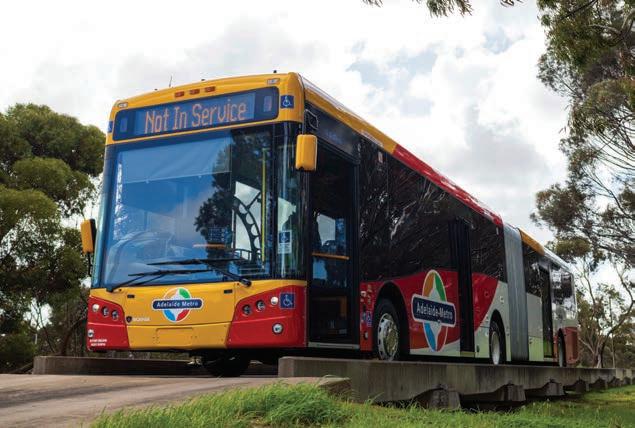
LOCAL ADELAIDE bus fans are loving being at the right place, right time to luckily spot the very first Bustech-bodied articulated Scania bus undergoing testing on the city’s O-Bahn transit system, scoop pics reveal.
The keen interest is being heightened by the fact the last new Scania ‘artic’ delivered to the O-Bahn and Adelaide’s nice wide city streets was in 2013, nearly 10 years ago, trainspotters (bus-spotters?) have explained.
As ABC magazine understands, the Euro 6-emissions K360- chassis bus in action is one of three artics, part of a 20-bus order all due to be delivered by December, 2021.
Additionally, we understand these are the very first artics that either Precision or Bustech have ever done.
Benefits of Euro6 artics, as experts will profess, include lower carbon emissions, less noise, they help get cars off the road, and they are easier for elderly passengers to board and alight from.
Above:
The first Bustechbodied articulated Scania bus is undergoing testing on Adelaide’s O-Bahn transit system SNEAK PICS
When ABC asked around the bus industry traps, we were assured further information about the tests and delivery would be forthcoming soon.
Until then, here are some sneak images, courtesy of Adelaide local Nic Benn, to get Bustech-Scania bus fans through the sleepless nights...
IVECO AUSTRALIA NEW BUS BOSS ANNOUNCED
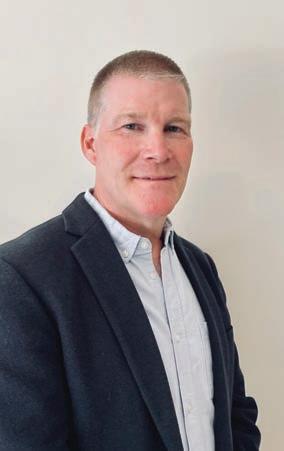
Above:
Current head of sales – truck and van, Glen Dyer, has assumed responsibility for the bus and special vehicles portfolio. FOLLOWING A range of organisational changes at Iveco Australia, recently, latest re-appointments include a new bus department head, while company stalwart Steve Heanes departs.
In a move to, “…allow the company to further streamline operations and better respond to customer needs,” the latest appointments take effect immediately across sales, aftersales, product development and marketing, and will assist Iveco to reposition itself in the lead-up to several exciting new model releases, whilst placing a renewed emphasis on customer support, it states.
Current head of sales – truck and van, Glen Dyer, has assumed responsibility for the bus and special vehicles portfolio, Iveco Australia confirms.
Dyer joined Iveco earlier this year and has extensive senior experience in the commercial vehicle industry with another prominent OEM, Iveco states.
Additionally, a newly created position to head Customer Services has been filled by Margot Baker, who previously held the role of legal counsel at Iveco.
Baker began with the company in 2016 and has gained a substantial understanding of the business and the needs of customers, Iveco explains.
Current Iveco head of network development Ella Letiagina’s role has been expanded to include product and marketing.
Letiagina joined Iveco in January and brings a wealth of automotive and management experience, both in Australia and internationally, the company explains.
In the product department, Iveco stalwart Marco Quaranta has assumed the position of strategic relations and industry relations manager with a focus on propulsion, while experienced Iveco product manager Emiliano Foieri has been promoted to product management lead.
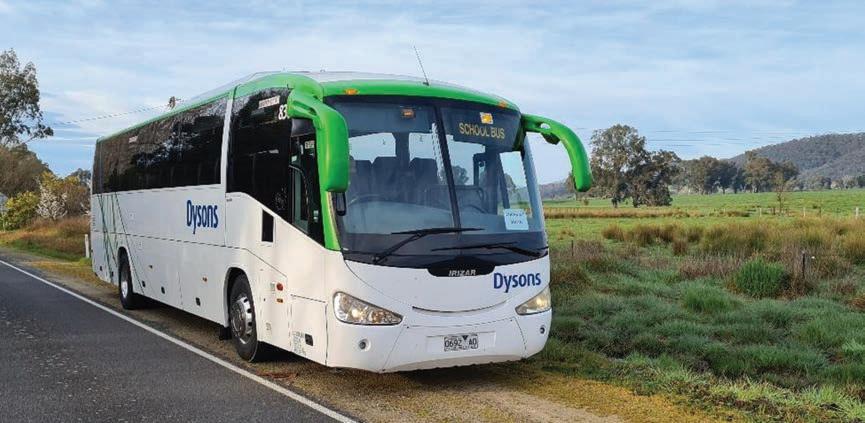
DYSON WOMEN BUS DRIVERS SMASHING CULTURAL AND GENDER BARRIERS
A QUIET REVOLUTION is happening at Dyson’s bus depot in Shepparton, Victoria, where, since 2019, the Dyson Group has welcomed and trained three special women as bus drivers – breaking down traditional cultural boundaries and creating career pathways for a new generation of professional bus drivers, the company explains.
In 2019, Gurpreet Kaur was looking for a career change. She recalled: “I used to be an aged care worker, but I wanted to do something new, something that had not been done by the woman of my community before.
“I took the initiative to get my bus license and the Dyson Group offered me a job.
“I am very proud to be the first woman in my community to become a bus driver.
“The job gives me independence and control over things,” said Kaur.
The flexibility of the work fits in around Gurpreet’s other important roles of wife, mum and community volunteer, Dysons explains.
“It has been such a positive experience for me that I encouraged two of my friends, Ritu and Raman, to get their licences and they have also joined the company,” Kaur explained.
“It would be unheard of for a woman to drive a heavy vehicle in India.
“I love that we are being trailblazers for our community,” she said.
Fellow bus driver Ritu Raj Kaur Badyal added: “Compared to previous work, I feel as though I have more respect as a bus driver.”
COMPANY ASSETS
It is a win-win arrangement for the Dyson Group, the company says.
Dyson Group regional services operational manager Roy Dyson said: “These ladies have been an asset to the company.
“They are careful and considerate drivers and that is shown in the amount of wear and tear on the buses they drive and the passenger comfort.
“In particular, they have a fabulous customer service manner with children and students who are regular users of our bus services.”
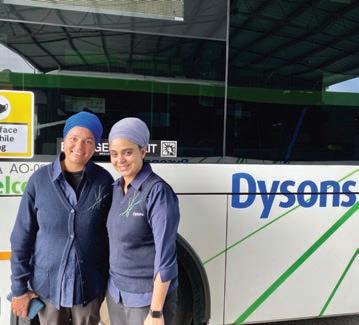
Above:
Dyson’s bus depot in Shepparton, Victoria, is working with women from the local Indian community to create career pathways for the next generation of bus drivers. HIGH CALIBRE
Dysons Group manager – people, culture & values, Rochelle Dickason said: “Recruitment for new drivers can be challenging in regional communities.
“These ladies have been instrumental in attracting new drivers of an excellent calibre and breaking down perceived barriers.
“Our workforce continues to change and become even more diverse, which is great for the community and our business,” she explained.
NSW BUS, TRUCK ‘GREEN HYDROGEN’ BOOST VIA $15 MILLION PLANT
A $15 MILLION Western Sydney gas plant will be generating ‘green hydrogen’ for use by transport and industrial customers from early 2022 following a joint commercial agreement announced recently.
Energy infrastructure company Jemena – backed by the State Grid Corporation of China and Singapore Power – and gas company Coregas will collectively be supplying green hydrogen, available to New South Wales for the first time, for the state’s transport sector, they confirm.
Buses, trucks and cars powered by green hydrogen could soon be a reality thanks to the new agreement touted as a ‘boost to NSW’, which takes effect from early 2022, they state.
Jemena general manager for renewable gas, Gabrielle Sycamore, says the agreement further demonstrates the potential of green hydrogen to store renewable energy and integrate future gas, electricity and transport refuelling networks.
“We know that green hydrogen has the immediate potential to become a viable zero-emission alternative to many petroleum-based fossil fuels currently used by industries such as transport and remote power generation,” Sycamore said.
“Hydrogen fuel cells are particularly well suited to long-distance heavy haulage trucking requirements based on their comparatively light weight and fast refuelling times, which can be just a matter of minutes.”
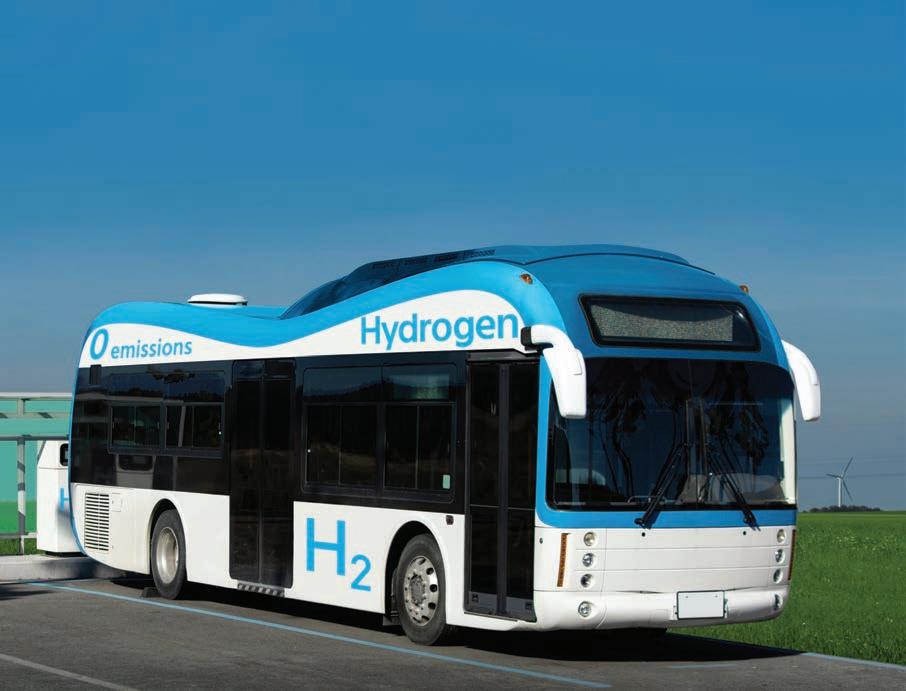
BUS APPLICATION
Hydrogen is used to power fuel-cell buses and cars in countries around the world, many will appreciate. In Japan, 500 fuel-cell vehicles were being used to transport competitors and staff at the belated 2020 Tokyo Olympics (hydrogen was also being used for the first time to power the Olympic torch flame), while in London – and like many other cities – hydrogen fuel-cell busses are being used for public transport across the city, they highlight.
The green hydrogen will be produced at Jemena’s $15 million Horsley Park-based Green Gas Project in Western Sydney, they confirm.
Co-funded by the Australian Renewable Energy Agency (ARENA), the Power-to-Gas project is converting ‘renewable electricity’ to hydrogen gas, which can be blended and stored in Jemena’s gas distribution network to supply New South Wales homes and businesses, they explain.
“Together with the Western Sydney Green Gas Project, Jemena is bringing renewable gas to homes and businesses across New South Wales, [while] it’s also offering the transport industry the opportunity to create their own path to a low-carbon future,” Sycamore said.
“Our partnership with Coregas is an exciting extension to the Western Sydney Green Gas Project and will allow the New South Wales transport industry to innovate by offering cleaner energy solutions to their customers.”
COMPRESSION AND STORAGE
Coregas executive general manager Alan Watkins says the company is working hard to apply its expertise in hydrogen distribution, compression and storage as part of Australia’s transition to a hydrogen economy.
“Transforming the transport sector is a critical piece of the puzzle, and we are delighted to partner with Jemena to make renewably generated green hydrogen available to the transport industry in New South Wales,” Watkins said.
Above:
“We are delighted to partner with Jemena to make renewably generated green hydrogen available to the transport industry in New South Wales,” said Coregas executive general manager Alan Watkins.
BUS E-MOBILITY STAFF CHANGES AT VOLVO AUSTRALIA
VOLVO BUS AUSTRALIA (VBA) has made key new appointments to support its bus electro-mobility projects, the company recently announced.
Dean Moule has been promoted to the newly created role of electromobility product director, Asia Pacifi c Region (APAC), and Mark Fryer consequently promoted to the role of national sales engineering and bodybuild manager, Volvo Bus Australia – effective July, 2021.
With 35 years’ experience in the automotive industry and having spent the past 12 years as the sales engineering and bodybuild manager at Volvo Bus Australia, Moule brings with him a wealth of knowledge and insight, Volvo says.
He was involved in VBA’s fi rst electro-mobility initiative with its hybrid project, developing and introducing the B5L S-Charge chassis to the Australian market a decade ago and, more recently, has been the electro-mobility project lead on the development of Volvo’s BZL electric chassis (due to be launched later in 2021).
Fryer will be taking Moule’s place as VBA’s national sales engineering & bodybuild manager. With more than 20 years’ experience with electrical systems – and having worked for Volgren for the past 15 years prior to joining VBA as technical and bodybuild support manager in early 2020 – Fryer has an exceptional understanding of the industry, as well as of high-voltage technology, says VBA.
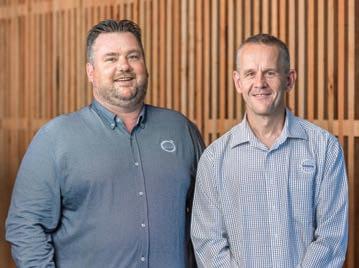
Above:
Mark Fryer (left) and Dean Moule
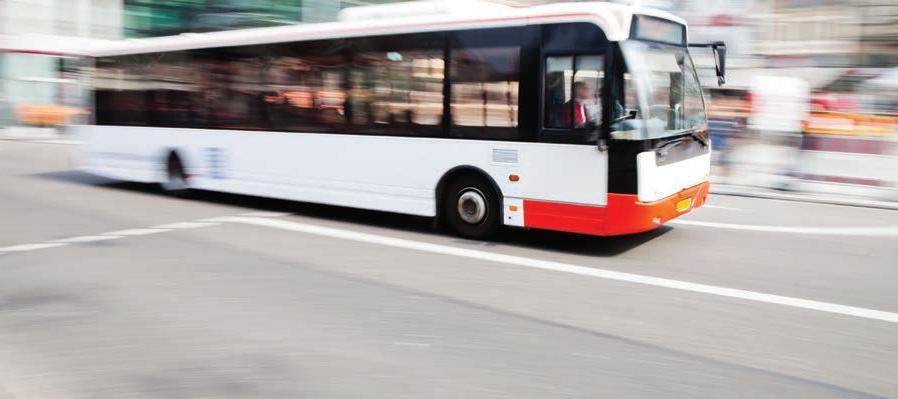
VOLVO S-CHARGE HYBRID BUS: “NEXT BEST ALTERNATIVE”
PRIOR TO ITS new BZL electric bus chassis debuting on Australia shores this year, Volvo Bus Australia (VBA) is reminding the local market of the value of its S-Charge hybrid bus, essentially given the still relative infancy of e-bus fleet charging infrastructure here.
Touted as “…the next-best alternative to electric buses” – and with more than 10 years of electro-mobility experience in the Aussie market – VBA is acknowledging the major role that its B5L S-Charge chassis has made in, “…paving the way towards this technology, with these hybrid vehicles ranking in as the next-best alternative to electric buses.”
Following the initial release of the B5L S-Charge chassis in 2013, Volvo’s S-Charge chassis has been making waves in the industry where there are few of its kind, the company states.
“The environmental, technological and cost benefits offered by the B5L S-Charge sees the S-Charge product being the next-best alternative to fully electric buses,” stated Mitch Peden, general manager Volvo Bus Australia.
“Compared to regular diesel buses, Volvo’s hybrids enable up to a 39 per cent saving on fuel and emit up to 40 per cent less climate-impacting carbon dioxide.
“While fully electric buses can offer benefits beyond this, the large-scale implementation of electric buses will be a progressive journey rather than an overnight transition.
“Volvo’s B5L S-Charge is an immediately available product that can deliver part-time electric buses without operational constraints, and therefore plays an important role in the journey towards fully electric transport,” Peden explained.
CITY TRIALS
Perth, Brisbane and Adelaide were the earliest Australian cities to adopt the B5L S-Charge after VBA participated in the hybrid bus trials for Public Transport Authority of Western Australia in 2014, trials for Brisbane City Council in 2014, and trials for Adelaide Metro/Adelaide City Council in 2015.
Throughout the years, Volvo’s hybrid technology has demonstrated environmental benefits across these major cities in reducing C02 emissions, the company says.
The B5L S-Charge has also been instrumental in offering Zone Management technology, in allowing operators to achieve zero emissions in designated zones by operating exclusively in electric drive mode without relying on the electricity grid, or requiring expensive infrastructure for charging, VAB states.
This technology also has the capacity to enhance the passenger experience for commuters in promising a silent ride, and giving city-siders improved quality of life through decreased air and noise pollution, it adds.
CUSTOMER ACCEPTANCE
The Volvo B5L S-Charge has garnered a positive reception from small and large operators across the country, according to VBA.
Volvo’s B5L S-Charge combines a fuel-efficient 110kW electric motor, a right-sized 4-litre Euro 6 diesel engine and the Volvo I-Shift gearbox. Its design enables the use of bus bodywork with the same capacity as a conventional diesel or gas bus and features significant weight savings while allowing for passenger capacities on par with conventional diesel buses, it explains.
According to VBA, the B5L is built to cope with the needs of dense and demanding city traffic, but it is also suited for routes that service suburbs.
With great reliability and a servicefriendly layout for easy maintenance, the B5L S-Charge is designed to ensure optimum uptime for operators, it states.
“The B5L S-Charge chassis is part of VBA’s holistic approach to sustainable transport solutions and has done an incredible job in facilitating part of our electro-mobility journey towards zero emissions,” affirmed Peden.
“We’re very grateful to have operators of all sizes adopt this technology and to see cities across Australia reaping the environmental and economic benefits.”
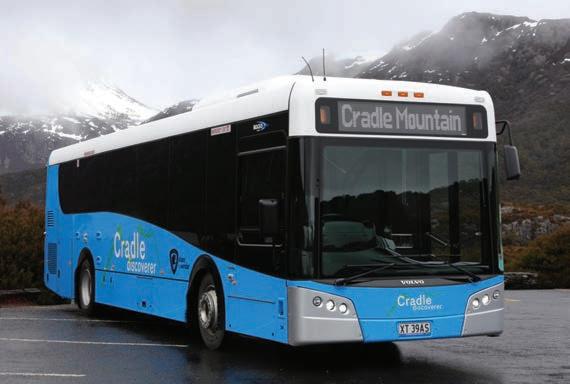
Left:
“While fully electric buses can offer benefits beyond this, the large-scale implementation of electric buses will be a progressive journey rather than an overnight transition,” said Mitch Peden, general manager Volvo Bus Australia.
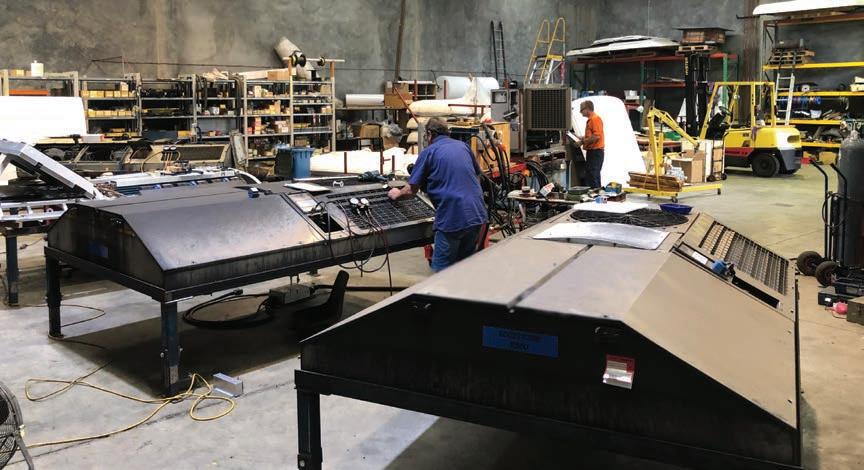
BUS AIRCON EXPERT APPOINTS CUSTOMER-SUPPORT DEVOTEE
AUSTRALIAN bus and coach air-conditioning expert Coachair has further expanded its commitment to customer support in appointing a new national parts manager, it’s announced.
Bringing a wealth of experience to the role, Coachair – established in 1978 as the first Australian designer and manufacturer of bus air conditioning systems to the market – has appointed Peter Soleski to the above-mentioned role, expanding the organisation’s commitment to customer support and service, it states.
Mechanically minded and with a strong background in parts, Soleski is described as an asset to the company.
“One of Peter’s great strengths is his ability to understand the mechanical reasons behind a breakdown and use that expertise to interpret the parts requirements to find a solution,” said Garry Webb, Coachair general manager, sales and marketing.
“He is experienced in delivering high-quality customer service to trade and business customers, which will be an asset for our clients.”
AUTOMOTIVE BACKGROUND
Coachair provides its customers with a comprehensive platform of aftermarket support, spare parts, technical support and ongoing maintenance.
Soleski is looking forward to applying his extensive automotive background to the transit industry and taking a lead role in delivering a total parts solution, he says.
“I get a great deal of satisfaction in problem-solving to find the best outcome,” Soleski stated.
“Getting the right part the first time gets customers back on the road quickly, helping to keep their business running,” he explained.
IT’S JUST NOT CRICKET
A keen cricketer, and previous president of his local cricket club, Soleski understands the dedication behind ongoing commitment, he says.
“I really believe in the ‘Through Life Support’ approach that is fundamental to Coachair’s customer service,” he confirmed.
“I’m excited to support our parts and service technicians to deliver that.”
ABOUT COACHAIR
Established more than 40 years ago, Coachair is a market leader in providing engineered Heating, Ventilation and Air Conditioning (HVAC) solutions for the bus and rail industry, it explains.
It provides Through Life Support for all HVAC solutions, and has diversified into sacrificial anti-graffiti window film and interior lighting and panel solutions in both the rail and bus segments, it confirms.
It remains the only company to design, build and manufacture air conditioning systems for the Australian bus and coach industry, it says. Coachair provides its customers with a superior, reliable product backed by a comprehensive platform of aftermarket support, spare parts, technical support, and ongoing maintenance.
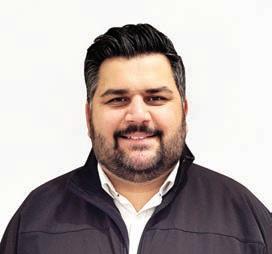
Above:
Coachair welcomes Peter Soleski.
Top:
“One of Peter’s great strengths is his ability to understand the mechanical reasons behind a breakdown and use that expertise to interpret the parts requirements to find a solution,” said Garry Webb, Coachair general manager, sales and marketing.
SCANIA MANDATES NHVR-COR COMPLIANCE MINIMUM
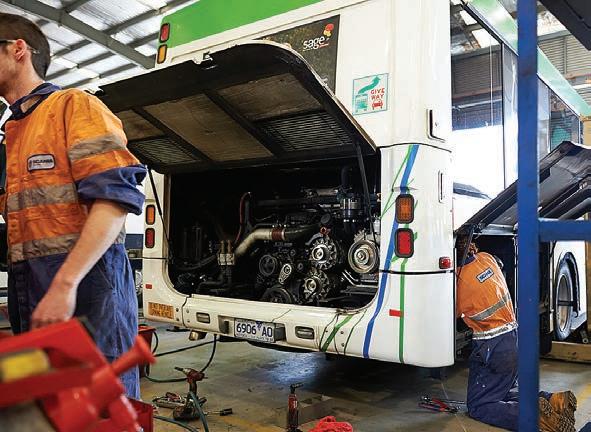
THE DUTY to meet Chain of Responsibility (COR) accountability and updated NVHR standards’ compliance was a motivation behind Scania Australia’s national bus and truck technician certification programme, which completed recently, it reports.
With the minimum aim to ensure all its technicians are fully qualified and compliant with state and national certification for the jobs they undertake, Scania says it is proud to have some of the best technicians in the industry, who all have access to the special tools, vehicle data, service manuals and training allowing them to, “…diagnose and service Scania trucks, buses and engines better than anyone else.”
As the company explains, the Australian transport industry is heavily regulated and COR is an important consideration for operators.
Service and repair workshop technicians require more than factory training and ‘years on the tools’, but actual certificates that confirm they are qualified to undertake work on heavy-duty vehicles, it explains.
In order to support the long-term availability of trained technicians, Scania has developed its own apprentice program, it reports.
There is a comprehensive introduction training program for recently employed technicians, as well as technical progression programs for existing technicians, it confirms. FOUR-LEVEL TRAINING
Scania workshops are equipped with special tooling that allows its staff to perform complex tasks in an efficient way and, as a company-owned distributor, Scania technicians are all enrolled in a bespoke four-level factory training program, it states.
“Scania is a premium brand and as
such our customers should feel confident that we always have suitably qualified staff working on their vehicles, both from Scania product knowledge, legal and NHVR compliance points of view,” said Patrik Tharna, Scania Australia director of aftersales.
“Over the past 24 months, Scania has invested heavily to ensure all our technicians have the relevant industry accredited qualifications required to perform a wide range of tasks,” he said.
“We introduced a special training program to upskill technicians who were restricted in terms of what their qualifications allowed them to do.
“I would say that we’re a standout in the industry.
“Many workshops may not take the trouble to ensure their technicians are formally qualified, but at Scania we are proud to say that we have a process to ensure all work is done by a technician with the relevant legal qualification.
“There is more than brand pride at stake here; there are legal requirements and ramifications if an unqualified technician works on a vehicle, which may later be involved in an incident while in service,” he explained.
“Many of our larger fleet customers who are required to ensure that they have suitably qualified repairers and technicians working on their vehicles under the NHVR, do check this with us and we are happy to provide these guarantees.”
INVESTING IN PEOPLE
Scania Australia’s workshop performance manager Mathew Wyatt says the company has set a high standard.
“We reviewed all of our 150 technicians nationwide and if there was an older qualification, or we thought that there may be a gap, then we have upskilled them to meet the latest formal qualifications,” Wyatt explained.
“This is important for our compliance with the NHVR regulations, and something our customers require, as well.
“When we sign contracts for
maintenance with large fleets, we are asked about the compliance of our technicians, and we have made sure that our people comply.
“Our recruitment process ensures from the first day that new hires are formally qualified, or, if not, that we have identified any gaps and will build a program to resolve this as a matter of urgency – and we will restrict the level of work that they can undertake until the program is completed.”
Above:
“Over the past 24 months, Scania has invested heavily to ensure all our technicians have the relevant industry accredited qualifications required to perform a wide range of tasks,” said Patrik Tharna, Scania Australia director of aftersales.
SCANIA ONLINE BUS ‘WORKSHOP’ LAUNCHED

VIRTUALLY INSTANTANEOS bus diagnostic and repair-need information – based on Apple iPad tablet technology – is now being rolled out across Scania’s company-owned branches Australia-wide, the company announced, recently.
Scania’s paperless Workshop Information Online innovation is helping to speed up servicing and repairs, getting customers’ buses back on the road more quickly, it states.
The iPad-based technology is providing technicians with real-time information about the buses they are working on, a complete work order list, as well as the ability to attach photos of damaged or broken components, which can be seamlessly sent to the customer in order to gain approval to proceed with repairs, Scania explains.
The service and repair information is then saved as part of the vehicle’s electronic history held on fi le by Scania, which can be reviewed the next time the bus returns to the workshop, it adds.

WIRELESS CONNECTION
From the moment a bus or coach arrives at a Scania branch for repair or service work, the service advisor and service technician can monitor its progress through the workshop, the company states.
Using the Workshop Communication Unit – a ‘blackbox’ installed in the workshop – technicians can wirelessly connect to the bus using the Scania Workshop Suite app on the tablet to identify real-time information on errors or failures, drawing attention to what needs to be fi xed prior to releasing the bus back to work, it says.
FASTER TURNAROUND
“Workshop information online is integrated with our dealer management system. It is completely online, always up to date and available anywhere with internet for users with credentials,” said Jason Grech, Scania Australia’s technical support manager.
“With this technology we’ll be able to turn buses around more quickly, as well as ensure we have a complete and accurate report on the vehicle condition and the work that has been carried out on it.
“Not only does the system guide the technician through a workfl ow, but the iPads also contain the full factory workshop manual for the exact model of bus being worked on, showing the technician which chassis or powertrain parts need to be replaced, plus showing how to remove and refi t them.
“A speech-to-text feature allows the technician to effortlessly send a message using the Wi-Fi system in the workshop to their supervisor, or the customer service representative, perhaps to order new parts, or to advise of the discovery of additional work required, without having to clean up their hands and manually write out a new item on the job card.”
Below:
Scania’s paperless Workshop Information Online innovation is helping to speed up servicing and repairs.
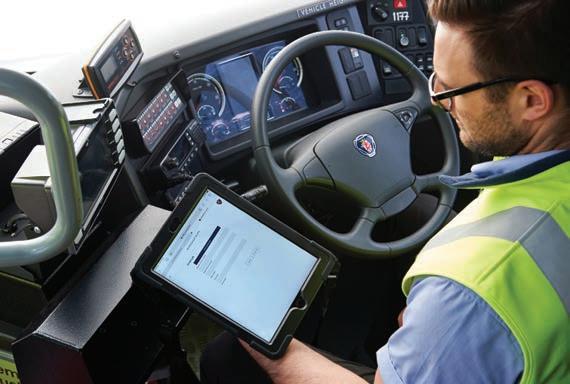

THE WOT!?!
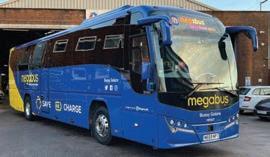
FROM DEPOT WITH LOVE
A British bus operator’s Bond-themed bus name has been doing the rounds on socials recently, even though it was actually unveiled in November, 2019.’Bussy Galore’ - punning on Goldfi nger character Pussy Galore - plies its trade around the northwest of England but is not the only unusually named bus out there, as online commentators pointed out. Coach operator Megabus actually has 46 named buses on the UK’s roads, ranging from Al Bus Dumbledore and Bussy the Vampire Slayer to I am Spartabus and – in homage of nautical favourite Boaty McBoatface – Mega McMegaface. For a full list, visit: https:// uk.megabus.com/spot-our-named-coaches
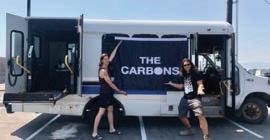
NON-HEINOUS
Missing the thrill of a live music performance in these lockdown times? You’re not the only ones. Canadian groove rock band The Carbons have taken matters into their own hands to build themselves a mobile stage on a bus. Complete with sound system, stage lights, solar panels and a rooftop stage to perform on, the 24-seater decommissioned accessibility bus has been gutted, revamped and named ‘Carol’, and allows the band to travel around Canada and play to gig-hungry fans hampered by Covid venue restrictions. Most excellent! To check out the bus, or the band, visit: www.thecarbons.ca
FREE FOR ALL
The City of Boston is aiming to increase the accessibility of its public transport by running a three-month trial of free bus rides on its busiest route. Route 28 carried 12,500 riders a day pre-pandemic, two-thirds of which were classifi ed as having a low income. Boston offi cials say that the aims of providing free public transport are to “lessen riders’ fi nancial burden at a time when economic vulnerability is at a historic high” and to boost “Boston’s reopening, recovery, and long-term renewal”. It is also expected to improve onboarding and travel times on a route that frequently runs behind schedule if passengers can board without paying. For more info, visit: www.boston.gov/departments/transportation/ free-route-28-bus-pilot
EXCITING ABC MAGAZINE RELAUNCH UNDER PRIME CREATIVE
AUSTRALASIA’s favourite bus and coach industry publication, ABC magazine, is undergoing an exciting relaunch of key products and services under its new ownership with Prime Creative Media (PCM), the company has announced.
As the nation’s largest B2B publisher, Australian-owned PCM recently acquired ABC magazine (www.busnews.com. au) along with a suite of other leading industry titles, in a galvanising move that brings to market an enhanced experience for all involved in the local and international bus and coach scene.
ABC magazine will now utilise the extensive resources and strengths of PCM, with a slew of developments including a new-look weekly newsletter and a dedicated business development manager (BDM), bringing a more tailored approach to communicating with and supporting avid readers and valued commercial partners alike.
Investing in both print and digital technology to further increase ABC magazine’s reach – notably building upon four years of online growth – the new-look assets aim to fulfil a cornerstone philosophy of Prime Creative to ‘grow’ the individuals, organisations and industries it engages with.
CLEAR FOCUS
Newly appointed BDM Matt Alexander says he’s inspired by the clear new focus of ABC magazine and welcomes the opportunity to help Prime Creative – a multi-platform publishing and events business engaged with high-growth industries – to fulfil its aims.
“I’m really excited to now be dedicated to the bus industry,” Alexander said.
“I’ve been involved in this industry for over five years and to now have a full focus on buses, and to also work with such an innovative bus community, I couldn’t be happier that Prime Creative asked me take on this role.
“Seeing a new direction and new products for ABC and BusNews.com.au, and to work with a talented team at Prime, can only enhance our readership experience and increase engagement with our content and advertisers”
CREATIVE VISION
PCM CEO John Murphy says the acquisition of ABC magazine was an important step in supporting this vital industry, by ensuring this leading publication continues into the future.
“We have been lucky enough to purchase Australasian Bus & Coach magazine recently with our purchase of the Trader Media Group,” he said.
“Prime Creative values this industry and product and
will be investing in growing the print and digital offering in this space.
“Having a variety of print and digital publications owned by Australian companies is critical to maintaining a diverse media landscape,” he explained.
“Far too many publications in this country are closing down, as they adopt digital-first strategies only to lose even more market share to Google and Facebook.
“By keeping Australian-owned publications alive, we can invest in quality journalists, and cover the important developments taking shape in these industries that play such a critical role in our economy.”
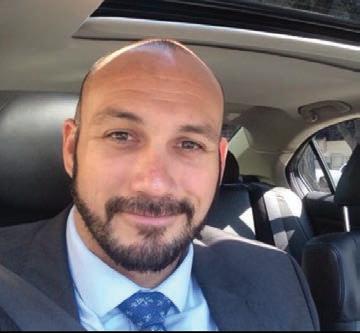
ABOUT PRIME CREATIVE
PCM publishes more than 80 print and digital platforms, it confirms. It is a top employer of media professionals in Australia, now employing
more than 130 full-time, Australian-based journalists, editors, graphic designers, business development professionals, and an inhouse IT development team, it states.
Throughout its history, PCM’s mission statement of growing individuals, organisations, and industries drives its work in industry-leading magazines, websites, newsletters and events focused on supporting critical industries to the Australian economy, it explains.
Above:
Now under the new ownership of Prime Creative Media (PCM), ABC magazine gets a dedicated businessdevelopment manager, Matt Alexander.








